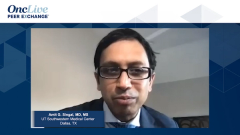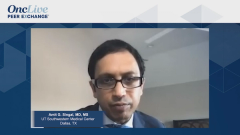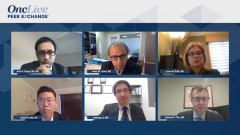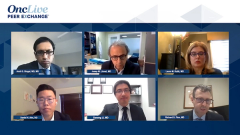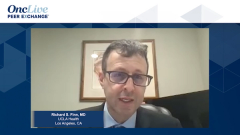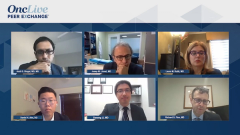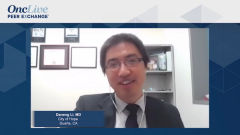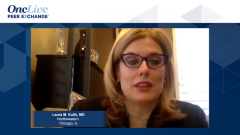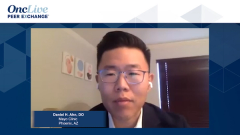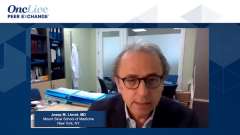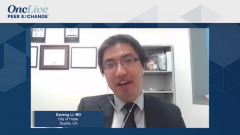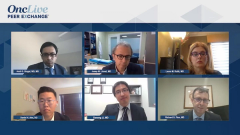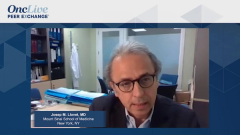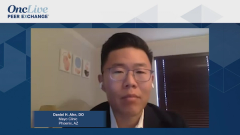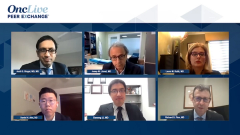
Personal Experience Using Atezolizumab-Bevacizumab in HCC Treatment
Laura M. Kulik, MD, leads a discussion about personal experiences using atezolizumab-bevacizumab and whether clinical trial data reflect real-world experience.
Episodes in this series

Richard S. Finn, MD: Laura, the atezolizumab-bevacizumab regimen has been around for some time now, about 6 or 7 months since its approval in June of 2020. What is your impression of its tolerability compared with what’s described in a phase 2 publication, in the real world, so to speak? Have you had much experience in getting an impression of how it’s viewed?
Laura M. Kulik, MD: My impression is that the regimen has been well tolerated. My concern, as Amit had brought up, is getting patients an endoscopy, especially in the era of COVID-19. Everything has been a little more challenging, and when you screen a patient for varices, if they have medium to large varices, you band them. But generally, the varices need to be banded again, which can sometimes take an average of 3 times of banding to get the varices scarred down enough. It takes time.
My concern has not so much been tolerability but the ability to get a certain group of these patients on the drug. What I’ve seen is people are starting, and I would like to hear your thoughts on this, the atezolizumab and holding the Avastin [bevacizumab]. That’s not how the trial was done. We don’t know how that will affect the results, as opposed to maybe starting lenvatinib or something where there’s still a risk of bleeding. It is not as high as what we’ve seen in the phase 2 bevacizumab trials, where it was almost 20%, but that includes some Child-Pugh B patients. Is this what we should be doing? I’m trying to get the varices banded as quickly as possible before telling the oncologist, “Let’s start the bevacizumab.” What you don’t want to see happen is people say we don’t want the delay; therefore, we’re not going to do the endoscopy and then you have someone die of a major variceal bleed.
Amit G. Singal, MD, MS: I was just going add 1 that you can’t skip the upper endoscopy based on if the patients looks OK. We see patients who are Child-Pugh A with a higher platelet count who still have a risk of varices. There’s no noninvasive way to assess this up front. It really requires that upper endoscopy. Laura, I agree that we’ve had a positive impression on this, but it’s also because we’ve been so adamant about doing the upper endoscopy. We don’t skip that prior to going in. I just think our impressions so far have been largely shaped because of our diligence in terms of performing the endoscopies.
Laura M. Kulik, MD: In particular the people with vascular invasion, they’re going to have portal pressures, so their risk of bleeding is going to be higher as opposed to a patient with metastatic disease. When these patients bleed, they have a higher risk of death just independent of having HCC [hepatocellular carcinoma] compared with a counterpart who does not have HCC.
Richard S. Finn, MD: That is an especially important point for someone who has never had an endoscopy. Six months is how the study was done. Is 6 months different from 9 or 10 months in practice? We need to get a feel for that.
Josep, who is the ideal candidate for atezolizumab-bevacizumab vs TKI [tyrosine kinase inhibitor]?
Josep M. Llovet, MD: As you know, I was very impressed with the data published in the New England Journal of Medicine and corroborated with data at ASCO GI [American Society of Clinical Oncology Gastrointestinal Cancers Symposium]. Nineteen months is an outstanding median survival, and this is already acknowledged as a standard of care. The question is: What percentage of patients are able to receive that? Here, we don’t know if this will be 80%, 70%, or whatever if all the drugs are available. What limits that in my mind, aside from autoimmune disease or any contraindications for the drug, is certainly the presence of untreated varices or the absence of endoscopy.
Of course, I agree that it is an academic view, Amit. I endorse that, as you can imagine. But certainly there are some indirect tools by which you can predict the likelihood of median or large varices in a patient in Child-Pugh A class with ALBI [albumin-bilirubin] grade 1, with a platelet count of 200,000 per mm3, a normal spleen with splenomegaly by 5% or less—still present but very low. In some scenarios you can apply that, but certainly I am endorsing endoscopy in all these cases.
The problem comes, as Laura mentioned, when you have large varices at the endoscopy, particularly in patients with portal vein invasion. Without portal vein invasion, the varices can be manageable. But in the case of patients with portal vein invasion, the varices will not be easy to treat with banding or with drugs. I would treat these cases with a single agent and either lenvatinib or sorafenib in the frontline setting. We don’t know the percentage, as I mentioned, and we don’t know the cost-effectiveness of these treatments in other countries. As we know, other countries also consider cost-effectiveness rules to apply all these treatments. There is a percentage of patients who will be treated in the frontline setting with a single agent, and I can envision—aside from those who do not tolerate, who have autoimmune disease—those who have large varices that are difficult to treat. I will move straight to single agents, and then we can discuss how we introduce immunotherapy in other lines.
Transcript Edited for Clarity


